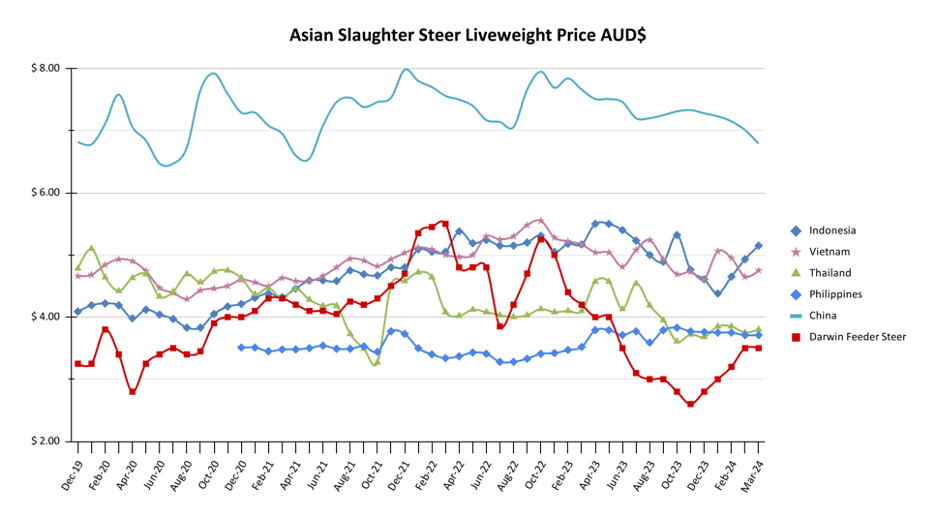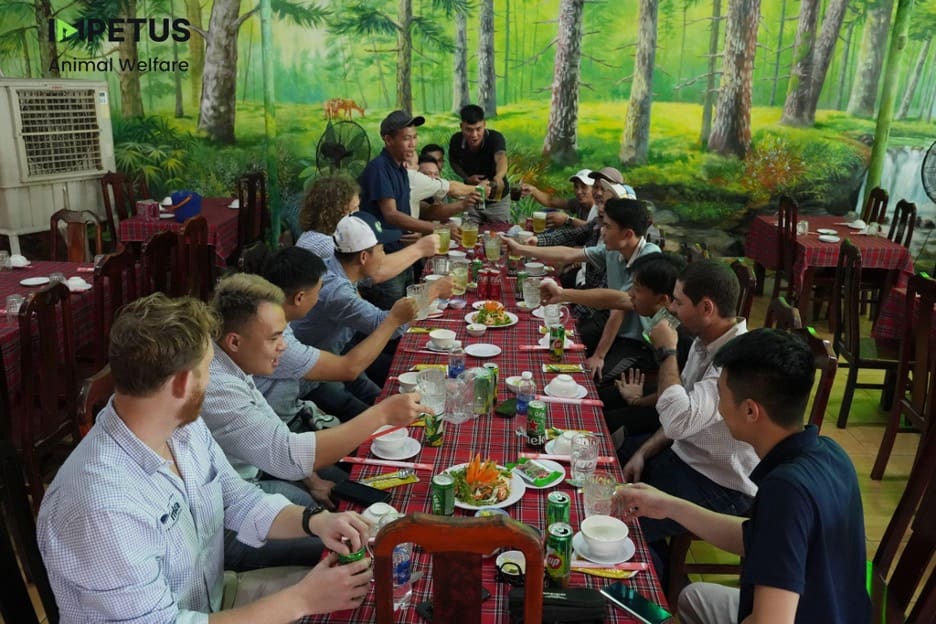
124th Edition: April 2024
Key points:
-
- Indonesian beef consumers suffer the consequences of delayed import permits.
- China’s pig and dairy industries struggle.
- Regional cattle price spread narrows.
Regional Trends and Overview
South East Asian countries are seeing the ramifications of government decisions which impact food staple flows as Indonesia experiences soaring beef and cattle prices in the aftermath of its early 2024 delay to release import permits for live cattle and beef imports, and the China pig and dairy industries struggle against increased imports and slowing consumer consumption.
 The dry conditions being experienced in the region continue with Indonesia and the Philippines reporting significant impacts to rice crops and other food staples. Local cattle producers are under stress as little rain has restricted availability of forage grasses and the price of concentrated feed continues to rise. Indonesia is importing large amounts of feed grain to replace a shortfall in feed corn and the price of feed corn for Indonesian poultry farmers is reported at almost 50% higher than a year ago. Indonesia generally protects its corn producers by taking a cautious approach to corn import volumes, preferring to use lower grade wheat imports to fill the supply gap, but given the severity of price increases has recently directed BULOG to import 500,000 tonnes of corn.
The dry conditions being experienced in the region continue with Indonesia and the Philippines reporting significant impacts to rice crops and other food staples. Local cattle producers are under stress as little rain has restricted availability of forage grasses and the price of concentrated feed continues to rise. Indonesia is importing large amounts of feed grain to replace a shortfall in feed corn and the price of feed corn for Indonesian poultry farmers is reported at almost 50% higher than a year ago. Indonesia generally protects its corn producers by taking a cautious approach to corn import volumes, preferring to use lower grade wheat imports to fill the supply gap, but given the severity of price increases has recently directed BULOG to import 500,000 tonnes of corn.
Both the Philippines and China have taken steps over the past few years to reduce foreign pork import tariffs and barriers to fill the gap left by African Swine Fever (ASF) in an effort to curb price spikes. The challenge now, as those local industries attempt to recover, is that they have lost market share to imports and face subdued pricing both because of more competetive imports and slow domestic consumption trends.
Countries in the region are progressing with efforts to develop and approve ASF vaccines, with a live attenuated vaccine now available commercially in Vietnam and some authorities already talking of a future where LSD vaccines are used to eradicate the virus. There are however concerns that a rushed attempt to roll-out vaccines may lead to less effective vaccines being used and in turn, mutated virus strains emerging which may be difficult to detect and in the long run hampering eradication or management efforts.
Nevertheless, an effective vaccine does seem possible at some point in the future. But whether we will see domestic pork production return to what it was, given the government strategies to open up other sources, is another question.
A topic which has flown somewhat under the radar is the almost complete loss of the Malaysian slaughter cattle export market. In the wake of last year’s short suspension of the Malaysian trade due to LSD concerns the Department of Veterinarian Services (DVS) imposed a 45 day quarantine requirement for cattle arriving from Australia, this despite the fact Australia never had LSD. The 45 day period was recently reduced to 14 days after lobbying efforts from the industry and MLA. Despite this, exports to Malaysia are unlikely to pick up while the quarantine requirement remains in place as it adds additional costs and risks in an already price sensitive market. This is unfortunate as Malaysia has been an important destination for second grade cattle for the last decade, averaging around 20,000 head a year but falling to just 3,572 total in 2023. As I have previously covered, the trend for governments to take a heavy handed approach to legitimate trade, while under-managing ‘grey trade’ is a reality worth recognising.
Indonesia: Steers AUD $5.15 / kg live weight (IDR 10,487.66 = 1 AUD)
Beef Price Surge Ahead of Eid al-Fitr and Buffalo Meat Importation
Beef prices in Indonesian markets surged in the lead-up to this week’s Eid al-Fitr, the end of Ramadan. Beef is currently selling at an average of $15.29 AUD/kg – $15.76 AUD/kg (Rp 160,000 to Rp 165,000/kg) and is predicted to reach $16.24 AUD/kg (Rp 170,000/kg). In DKI Jakarta, the price has escalated to $21.58 AUD/kg (Rp 225,900/kg). The carcass price has also soared to over $9.55 AUD/kg (Rp 100,000/kg), now standing at $10.41 AUD/kg (Rp 109,000/kg). This increase is placing a financial strain on both consumers and meat vendors, with some opting for more affordable alternatives such as chicken or fish. However, the prices of chicken and eggs have also risen, a consequence of the massive rise in corn prices.
2,583 Cattle Arrived from Australia
On 1 April 2024, ID Food imported 2,583 cattle from Australia, aimed at meeting the Eid al-Fitr meat demand. Observations were made on the animals’ health, the unloading process, and their distribution. These cattle, primarily brahman cross or Australian commercial cross, are earmarked for fattening or immediate slaughter, depending on their weight. ID Food is also participating in the Affordable Food Movement to ensure the public has access to reasonably priced meat.
Local Cattle: Bloating Activities Ahead of Eid al-Fitr
In Boyolali, Central Java, the police arrested an individual for artificially inflating cattle before slaughter, a practice aimed at increasing meat weight and thereby profit, constituting animal cruelty and a violation of Article 302 of the Indonesian Criminal Code. The practice itself is well known in other parts of Asia, especially into the markets in Vietnam as it increases meat yield. This is often combined with salts or other additives to increase absorption of the water into the tissues. The practice is not known to be routinely performed in Indonesia and the reaction by authorities is a significant deterrent.
DAFF’s Partnerships with the Animal Quarantine Task Force (Barantin)
The Department of Agriculture, Fisheries and Forestry (DAFF) is collaborating with Barantin to control the spread of lumpy skin disease (LSD), offering scholarships and training to enhance capacity in managing transboundary animal diseases. These initiatives aim to bolster Indonesia’s capability in veterinary diagnostics and epidemiology, contributing to global efforts in animal health and safety. Consistent ongoing engagement like this with our Indonesian neighbors is going to be crucial for low term plans to reduce LSD prevalence in the region.
Vietnam : Steers AUD $4.75 / kg live weight (VND16,524.55 = 1AUD)
On a recent trip to Vietnam to deliver animal handling training I had the opportunity to chat to abattoir owners and staff about the impact that changing Australian cattle supplies have on their businesses.
 Over the last ten years we have seen exports to Vietnam vary massively, peaking at over 300,000 head in 2015 and falling to as low as 58,000 head in 2022. 2023 saw the market rebound somewhat to exceed 120,000 head. This elasticity in market volumes creates significant challenges for the supply chain. As our Australian Department of Foreign Affairs and Trade (DFAT) funded project has been finding, the willingness to invest in abattoir capacity and sophistication is challenged by this uncertainty. Attempting to build mature and sustainable business models requires consistency of supply and consistency of product to the consumer. For abattoirs who can afford Australian cattle one year, but not the next, this is extremely difficult.
Over the last ten years we have seen exports to Vietnam vary massively, peaking at over 300,000 head in 2015 and falling to as low as 58,000 head in 2022. 2023 saw the market rebound somewhat to exceed 120,000 head. This elasticity in market volumes creates significant challenges for the supply chain. As our Australian Department of Foreign Affairs and Trade (DFAT) funded project has been finding, the willingness to invest in abattoir capacity and sophistication is challenged by this uncertainty. Attempting to build mature and sustainable business models requires consistency of supply and consistency of product to the consumer. For abattoirs who can afford Australian cattle one year, but not the next, this is extremely difficult.
It is interesting to note the difference between Australian boxed meat exports and live export in this regard. During the recent lofty heights of Australian cattle prices, Australian processors continued to operate and supply their customers, reportedly taking significant losses on a per head basis. They did this, presumably, to maintain relationships with their hard-won customer base and because of significant overhead investments in plant and people. In the live export supply chain the steadying influence in a market like Indonesia comes from feedlotters, who have similar motives to Australian processors to operate, even when running at a loss. But in the Vietnam market where cattle primarily come in at slaughter weight, or close to, the feedlotters do not have a feed-margin available to soften the trading margin blow, and abattoirs have an alternative source of cattle coming out of Thailand. So when Australian prices rise, they stop importing, and when they stop importing, they lose market share to Thai cattle or cheap meat imports. Trying to rebuild Indonesian volumes from 300,000 head to 600,000 head, when many importers have kept the wheels turning is one thing. Trying to recover Vietnam from 50,000 head to 300,000 head is a much steeper hill to climb.
Source: Impetus Animal Welfare – Post training Vietnamese hospitality
Philippines: Slaughter Steers AUD $3.71 / kg liveweight (P 37.23 = 1AUD)
The Philippines cattle market has continued to sit fairly flat with no significant changes in cattle but beef prices continue to rise along with most meat. The slaughter steer price still sits at around the $3.53 – $3.94 AUD/kg (P.130/kg – P.145/kg) mark, similar to last month. Knuckle prices in Mindanao wet market were up at $15.72 AUD/kg (P.580.00/kg) and supermarket $17.11 AUD/kg (P.630.00/kg). Chicken prices have increased significantly since the last report to $4.62 AUD/kg – $5.84 AUD/kg (P.170.00 – P.215.00/kg) for non branded and Magnolia brand respectively. Our source in the Philippines notes that meat price increases have surprised many consumers, given that consumer spending usually hits a lull post the Easter holiday period.
China: Slaughter Steers AUD $6.79 (RMB 4.79 = 1 AUD)
Slaughter cattle prices continue to slide in China as consumer demand continues to slow, a problem attributed to its aging population demographics. Despite the steady growth in China’s national beef production capacity and an increase in the total volume of beef imports, the beef cattle industry encounters significant obstacles and setbacks. The trading price for live slaughter cattle continues to decrease, alongside a drop in both imported and domestic beef prices. This sluggish market trend has repercussions for the breeding sector, leading to a substantial reduction in the economic profitability of beef cattle farming.
The dairy industry in China is also struggling with an oversupply issue. The Chinese dairy herd has grown by more than a quarter since 2019, but consumption growth has not kept up with the increased supply. In 2023 Australian dairy cattle export numbers to China took a dive of more than 40% as dairy cow prices are reported to have fallen to less than 50% of prices from several years ago. The slaughter cattle market, given the protocol complexities and costs, has not been active since 2022.
Source: MLA LiveLink Report – China cattle export totals
There continues to be interest shown in the potential for Australian slaughter cattle to enter China via Vietnam and Laos, thereby avoiding the challenging import protocols required by China for direct supply of Australian cattle. When Ross Ainsworth wrote on this topic in October 2022 he was using an Australian cattle price of $4.50 for his back of the envelope calculations which suggested margins would not be attractive enough to make the idea feasible. That price is now closer to the $3.00 AUD mark, but given the corresponding fall in the Chinese cattle market prices, the overall equation is unlikely to have changed. This is on top of the significant challenges that this pathway faces in terms of need for significant investment and animal welfare considerations.
Feeder Steers Darwin $3.45 Townsville $2.90
Live export ships have recently been focusing on Townsville with a few ships headed to QLD this week to pick up consignments. Indonesian feedlotters will be juggling complex turn-off schedules given the early 2024 gap in supply and the higher sales volumes from the recent Eid al-Fitr demand.
2024 – Year to February figures for cattle sea freight across Asia by state
Source: DAFF website
2024 – Year to February for cattle sea freight comparison across Asian markets
Source: DAFF website








Meat companies are not silly about money and if things were as bad as they claim they would simply close. Nothing comes before profit for these guys.
Full, and genuine names required for future comments please Frank – as per our long-standing reader comment policy. Failure to conform will simply see submitted comments not published. Editor